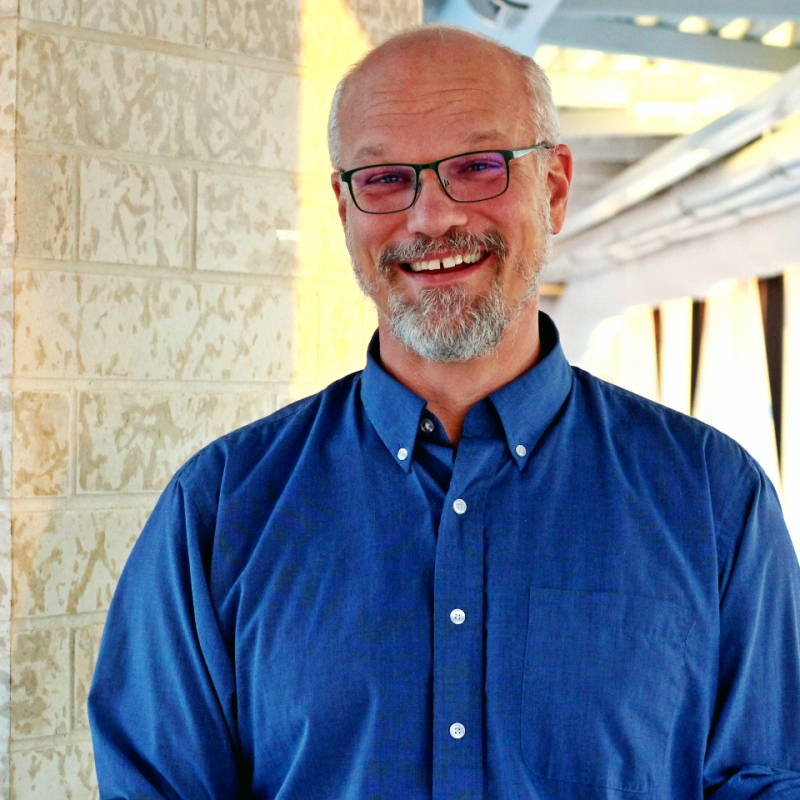
Faculty: In Their Own Words - Dr. Jonathan Dueck

Dr. Jonathan Dueck, Vice-President Academic, Academic Dean, Associate Professor of Social Science (Ethnomusicology), and of Writing, has taught at CMU since 2017.
What do you love about your work here?
I like the sense of play that we have as an institution. We invite people to do things they care about, things they're passionate about, and to try them out. As students, as faculty members, and even as an institution, we're willing to try new things in a way that is about what we love.
What are you teaching right now that you're most excited about?
I'm teaching an introductory writing course this year called Writing the University. My general orientation towards writing is I want people to understand that writing is something where you're actually doing something in the world. It's not an exercise—you're trying to reach somebody, you're trying to move them. When you can bring a real audience of some kind into the classroom, that really changes the stakes for students. They start to write with passion, with purpose, with clarity that would be different if they were simply imagining writing it for me. The first unit, students in teams work to research and write an op ed, the opinion piece that's opposite the editorial page...The second unit we learn how to write a close reading of something, which is what you do in the humanities...In the last unit, students write proposals for CMU, like for steps for equity and diversity, curriculum changes, all kinds of stuff. In each of those three units, we have a writer come in. It's so much fun to teach!
What are you researching and writing?
I taught at the University of Maryland and Duke University, both banner schools for basketball. I taught this big class called The Impact of Music on Life. I had a class scheduled on anthems, and the night before, the University of Maryland's women's basketball team won the NCAA tournament, which is a really difficult thing to do and is big news. My partner and I were on campus, watching this videocast of it in the student centre, and suddenly when it became clear we were going to win, the whole room just popped up and down like popcorn. You were squished up against people and everyone was sweaty and loud and then they all started to sing. These were my students, who told me they couldn't sing! The next morning, I had this class with them on anthems, and it was clear nobody had done the work. So I said, okay, let's talk about sports—and the whole 250-student class sang the Maryland victory song. I thought, why hasn't anybody written about this? This is a place where people come together across race and class and religion and ethnicity, and they feel things together. I was interested in understanding how you can feel things together in real time...somehow attuning to one another. You can see this dramatically in church music, but you can see it across all kinds of difference in sports in a way that just fascinated me. So I started a project in 2007, and the book will be published in the next few years. It'll be the first ethnomusicological monograph that's about collegiate basketball. I spent time with bands, players, fans. I played all of the video games that have been connected with collegiate basketball from the late 1970s until now. I got teams of students to go and tweet, so you had this sound and snapshots from people around the space. In the end, I hope it'll be a book that helps us understand how people connect with one another and how music is not special in that it's primarily different from other kinds of relating to one another, but it's special in that it's foundational.
Where or how do students give you hope?
I think it does actually go back to this notion of play. I really like it when students try something that is a little bit out of their comfort zone and I can see them try it and grow. People have all kinds of fears about sharing their work with each other. I remember one case where a student was not sure they wanted to present their work...then their friend came to them and they both went up together and the student knocked it out of the park. They wrote this beautiful essay, presented it in a lovely way, got this generative and interesting feedback, and afterwards they wrote more and wrote differently. There's bigger and more dramatic stories than that, but that's the nugget of it: that students try new things that amount to them caring for and trusting each other, and that's how we make things happen in the world in a good way.
What you are reading for enjoyment?
Over the pandemic I read almost exclusively P.G. Wodehouse because it's very nice to have an orderly and beautiful and funny universe where everything turns out all right. Since the pandemic, I've been reading dystopian fiction. I'm reading this fantastic book called Spook Country by William Gibson. It's gorgeous and poetic, but it's these spy stories that are near future, that imagine things about currently existing technologies and the way people relate over those technologies.
Printed from: media.cmu.ca/profile-jonathan-dueck-fitow